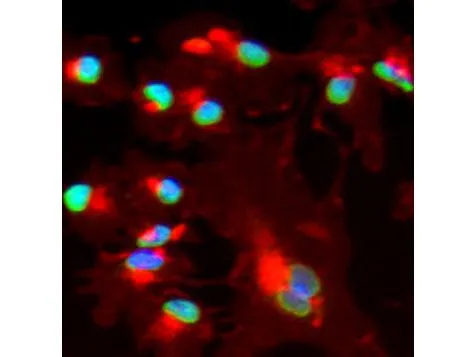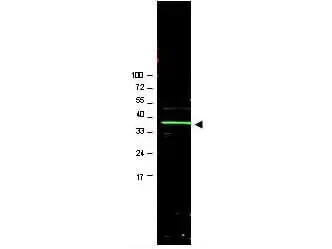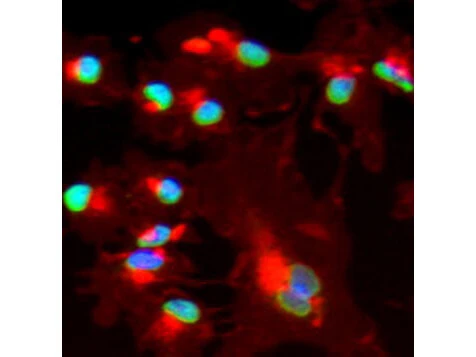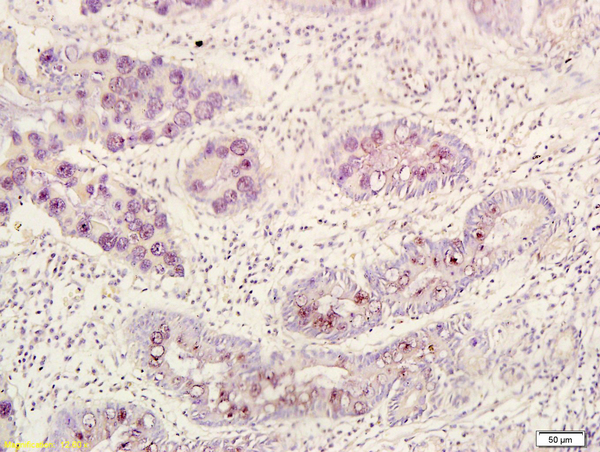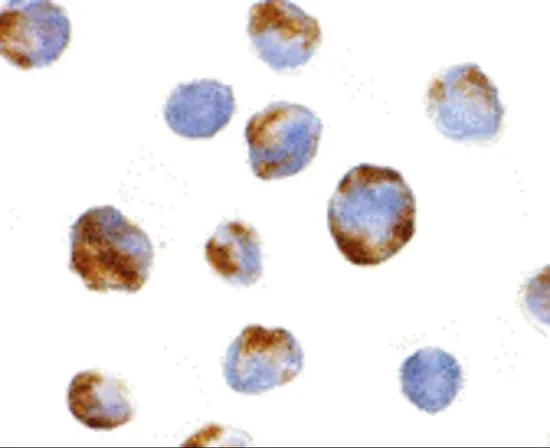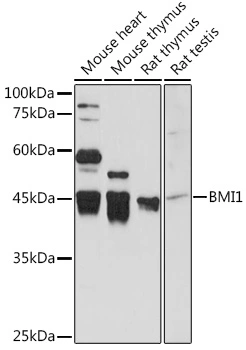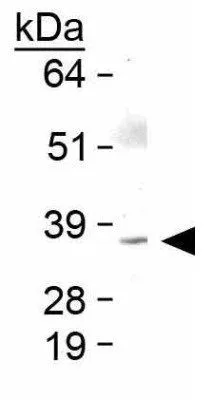![Western blot using GeneTex's Affinity Purified anti-Bmi1 antibody shows detection of a band ~37 kDa corresponding to human Bmi1 (arrowhead). Approximately 20 μg of a U2OS whole cell lysate was separated by 4-20% SDS-PAGE and transferred onto nitrocellulose. After blocking in PBS containing 5% nonfat dry milk, the membrane was probed overnight at 4o C with the primary antibody diluted to 1:1,000 in PBS containing 1% nonfat dry milk. The membrane was washed and reacted with a 1:20,000 dilution of IRDye800 conjugated rabbit anti-Goat IgG [H&L] for 45 min at room temperature. IRDye800 fluorescence image was captured using the OdysseyR Infrared Imaging System developed by LI-COR. IRDye is a trademark of LI-COR, Inc. Other detection systems will yield similar results. Western blot using GeneTex's Affinity Purified anti-Bmi1 antibody shows detection of a band ~37 kDa corresponding to human Bmi1 (arrowhead). Approximately 20 μg of a U2OS whole cell lysate was separated by 4-20% SDS-PAGE and transferred onto nitrocellulose. After blocking in PBS containing 5% nonfat dry milk, the membrane was probed overnight at 4o C with the primary antibody diluted to 1:1,000 in PBS containing 1% nonfat dry milk. The membrane was washed and reacted with a 1:20,000 dilution of IRDye800 conjugated rabbit anti-Goat IgG [H&L] for 45 min at room temperature. IRDye800 fluorescence image was captured using the OdysseyR Infrared Imaging System developed by LI-COR. IRDye is a trademark of LI-COR, Inc. Other detection systems will yield similar results.](https://www.genetex.com/upload/website/prouct_img/normal/GTX45791/GTX45791_20160330_WB_w_23060820_955.webp)
Western blot using GeneTex's Affinity Purified anti-Bmi1 antibody shows detection of a band ~37 kDa corresponding to human Bmi1 (arrowhead). Approximately 20 μg of a U2OS whole cell lysate was separated by 4-20% SDS-PAGE and transferred onto nitrocellulose. After blocking in PBS containing 5% nonfat dry milk, the membrane was probed overnight at 4o C with the primary antibody diluted to 1:1,000 in PBS containing 1% nonfat dry milk. The membrane was washed and reacted with a 1:20,000 dilution of IRDye800 conjugated rabbit anti-Goat IgG [H&L] for 45 min at room temperature. IRDye800 fluorescence image was captured using the OdysseyR Infrared Imaging System developed by LI-COR. IRDye is a trademark of LI-COR, Inc. Other detection systems will yield similar results.
Bmi1 antibody
GTX45791
ApplicationsImmunoFluorescence, Western Blot, ELISA, ImmunoCytoChemistry, Other Application
Product group Antibodies
ReactivityHuman
TargetBMI1
Overview
- SupplierGeneTex
- Product NameBmi1 antibody
- Delivery Days Customer9
- Application Supplier NoteWB: 1:500-1:13000. ICC/IF: 1:200. ELISA: 1:5000-1:30000. *Optimal dilutions/concentrations should be determined by the researcher.Not tested in other applications.
- ApplicationsImmunoFluorescence, Western Blot, ELISA, ImmunoCytoChemistry, Other Application
- CertificationResearch Use Only
- ClonalityPolyclonal
- Concentration0.91 mg/ml
- ConjugateUnconjugated
- Gene ID648
- Target nameBMI1
- Target descriptionBMI1 proto-oncogene, polycomb ring finger
- Target synonymsFLVI2/BMI1, PCGF4, RNF51, flvi-2/bmi-1, polycomb complex protein BMI-1, B lymphoma Mo-MLV insertion region 1 homolog, BMI1 polycomb ring finger oncogene, BMI1 polycomb ring finger proto-oncogene, murine leukemia viral (bmi-1) oncogene homolog, polycomb group RING finger protein 4, polycomb group protein Bmi1, ring finger protein 51
- HostGoat
- IsotypeIgG
- Protein IDP35226
- Protein NamePolycomb complex protein BMI-1
- Scientific DescriptionThe Bmi1 oncogene induces telomerase activity and immortalizes human mammary epithelial cells. Bmi1 extends the replicative life span of human fibroblasts by suppressing the p16-dependent senescence pathway. Polycomb group (PcG) genes are involved in the maintenance of cellular memory through epigenetic chromatin modifications. Recent studies have implicated a role for PcG genes in the self-renewal of hematopoietic stem cells (HSCs), a process in which cellular memory is maintained through cell division. Among the PcG genes, Bmi1 plays a central role in the inheritance of stemness, and its forced expression promotes HSC self-renewal. These findings highlight the importance of epigenetic regulation in HSC self-renewal and identify PcG genes as potential targets for therapeutic HSC manipulation. Involved in maintaining the transcriptionally repressive state of genes. Modifies chromatin, rendering it heritably changed in its expressibility.
- ReactivityHuman
- Storage Instruction-20°C or -80°C,2°C to 8°C
- UNSPSC12352203

